| Srl | Item |
| 1 |
ID:
109147
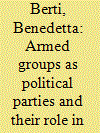

|
|
|
|
|
| Publication |
2011.
|
| Summary/Abstract |
In recent decades, armed groups have shown an increased interest in creating political parties to take part in institutional politics. By using these political wings to participate in elections and win public office, some of them have gained enormous political power. However, despite the important real-world implications of this trend, the existing literature on the topic is still underdeveloped. This article contributes to a better understanding of this subject by examining the factors that motivate armed groups to set up a political wing and compete in elections and by assessing how political participation affects an armed group's strategic outlook. The hypotheses on political wing formation and development are tested by analyzing the decision-making patterns of Hizballah. The findings suggest that the political involvement of armed groups does not follow a linear development process from armed to political organization, but instead assumes cyclical patterns: political accommodation and armed struggle are chosen in turn in response to shifts in the relation and the internal balance of power between a given group's political and armed wings.
|
|
|
|
|
|
|
|
|
|
|
|
|
|
|
|
| 2 |
ID:
064971
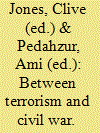

|
|
|
|
|
| Publication |
London, Routledge, 2005.
|
| Description |
vi, 141p.hbk
|
| Standard Number |
0415348242
|
|
|
|
|
|
|
|
|
|
|
|
Copies: C:1/I:0,R:0,Q:0
Circulation
| Accession# | Call# | Current Location | Status | Policy | Location |
| 049915 | 956.953044/JON 049915 | Main | On Shelf | General | |
|
|
|
|
| 3 |
ID:
077570
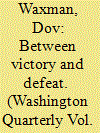

|
|
|
|
|
| Publication |
2007.
|
| Summary/Abstract |
Israel now stands at a crossroads. The lessons it draws from its recent war with Hizballah will shape future Israeli thinking and its relations with the Palestinians as well as the rest of the Middle East. It is imperative that it learns the right ones.
|
|
|
|
|
|
|
|
|
|
|
|
|
|
|
|
| 4 |
ID:
109786
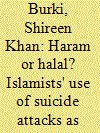

|
|
|
|
|
| Publication |
2011.
|
| Summary/Abstract |
Suicide attacks are an important, and effective, terror tactic in Al Qaeda and other Islamist Movements' (AQOIM) tool kit as they wage jihad al saghir (lesser jihad) against the kuffar (infidels). The successful 9/11 terrorist attacks on American soil would not have been possible without the willingness of 19 young Arab men to commit intihar (suicide). AQOIM's "marketing" of suicide attacks in their propaganda campaigns as "martyrdom operations," leads one to ask: Is the use of suicide as a military tactic in war against the kuffar sanctioned in Islam both scripturally and/or by the interpretations/opinions of Muslim scholars and religious figures, as well as by the Muslim public? This article explores the ongoing jihad (struggle) within Islam on what does and does not constitute "martyrdom operations." It does so by exploring the legality of such acts through the lens of Islamic doctrine (Quran and Hadith), as well as studying the interpretations of respected ulema (scholars) on whether or not suicide attacks are indeed "martyrdom operations" to be praised as "halal," or to be condemned as "haram" (forbidden).
|
|
|
|
|
|
|
|
|
|
|
|
|
|
|
|
| 5 |
ID:
068316
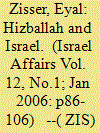

|
|
|
| 6 |
ID:
110853
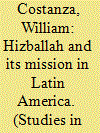

|
|
|
|
|
| Publication |
2012.
|
| Summary/Abstract |
The activities of Hizballah in Latin America generally have been viewed by governmental authorities in the region as a security concern primarily because of its importance in bilateral relations with the United States rather than as an internal terrorist threat targeted against their sovereign interests. This article explores Hizballah's network and past activities in South America to assess the nature of Hizballah's strategic aims in the region in support of its global organizational goals. The author argues that the perception of Hizballah as a legitimate political organization by Latin American governments has hampered efforts to effectively apply counterterrorism resources to root out the entrenched Hizballah infrastructure in the region that can potentially carry out directives by the Hizballah leadership or by serving as a proxy of Iran.
|
|
|
|
|
|
|
|
|
|
|
|
|
|
|
|
| 7 |
ID:
076620
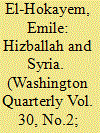

|
|
|
| 8 |
ID:
018077
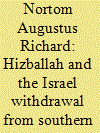

|
|
|
|
|
| Publication |
Autumn 2000.
|
| Description |
22-35
|
|
|
|
|
|
|
|
|
|
|
|
|
|
|
|
| 9 |
ID:
072187
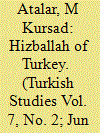

|
|
|
|
|
| Publication |
2006.
|
| Summary/Abstract |
This article covers the origins, features and ideological characteristics of the most militant Islamic organization in Turkey and shows that its threat to the existing order has been exaggerated. To do so it uses four analytical terms: politics, modernism, tradition and strategy. In addition to organizational shortcomings, the analytical survey demonstrated that Hizballah of Turkey can only be regarded as the "immediate" or "actual" threat, but not a "real" one. As a matter of fact, it has perished recently with emergency actions taken by security forces.
|
|
|
|
|
|
|
|
|
|
|
|
|
|
|
|
| 10 |
ID:
077577
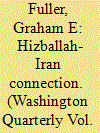

|
|
|
|
|
| Publication |
2007.
|
| Summary/Abstract |
Hizballah's growing power reflects a broad intensification of resistance to the status quo throughout the Middle East. Although invoking a "Shi'ite axis" with Iran and others may be a good political scare tactic, the phenomenon really signifies political change that is broader than sectarianism.
|
|
|
|
|
|
|
|
|
|
|
|
|
|
|
|
| 11 |
ID:
116385
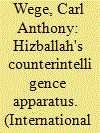

|
|
|
|
|
| Publication |
2012.
|
| Summary/Abstract |
Political scientist Roy Godson defined counterintelligence as the identification and neutralization of the threat posed by foreign intelligence services, and the manipulation of those services for the manipulators' benefit. 1 Organizational counterintelligence disciplines, while having focal entities, typically function as overlays across the whole of the intelligence enterprise. Between 2009 and 2011, the Hizballah organization engaged in a major counterintelligence sweep across Lebanon. Combined with other counterintelligence activity, since the 2006 Summer War (also called the Harb Tammuz) nearly 200 Lebanese citizens-Christians, Sunni and Shi'a Muslims, senior military and retired civilian executives-were arrested and credibly accused of espionage. Some of these Lebanese had spied on behalf of Israel for decades and others were more recently compromised. Following is a discussion of the increasing scope and complexity of Hizballah's counterintelligence apparatus in light of these developments.
|
|
|
|
|
|
|
|
|
|
|
|
|
|
|
|
| 12 |
ID:
077339
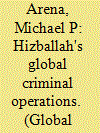

|
|
|
|
|
| Publication |
2006.
|
| Summary/Abstract |
The Lebanese Hizballah first emerged in the early 1980s as a loosely affiliated group of Shia militants but has since evolved into a sophisticated organization with several thousand supporters and members, and a multi-dimensional infrastructure. The group receives a significant portion of its funding from Iran, although, several highly publicized media reports released over the last several years revealed Hizballah also receives substantial monetary support from a worldwide network of criminal operations. This endeavor explores four criminal enterprises believed to be used to provide funding to the organization: Intellectual Property Crime, drug smuggling, cigarette smuggling, and the exploitation of the African diamond trade. A brief description of each enterprise is provided along with instances in which Hizballah's members and supporters have been found to be involved in such crimes and some indication of how much money has been funneled to the larger organization. The future of Hizballah's reliance upon this criminal network for financial sustenance is tentatively examined in light of increasing law enforcement attention and recent fighting with Israel.
|
|
|
|
|
|
|
|
|
|
|
|
|
|
|
|
| 13 |
ID:
094623
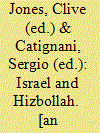

|
|
|
|
|
| Publication |
London, Routledge, 2010.
|
| Description |
ix, 202p.
|
| Contents |
Includes bibliographical reference.
|
| Standard Number |
9780415449106
|
|
|
|
|
|
|
|
|
|
|
|
Copies: C:1/I:0,R:0,Q:0
Circulation
| Accession# | Call# | Current Location | Status | Policy | Location |
| 054831 | 956.05/JON 054831 | Main | On Shelf | General | |
|
|
|
|
| 14 |
ID:
109146
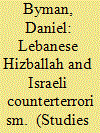

|
|
|
|
|
| Publication |
2011.
|
| Summary/Abstract |
This article examines Israel's attempts to weaken and defeat the Lebanese Hizballah. It reviews Hizballah's rise after the 1982 Israeli invasion of Lebanon, Hizballah's successful effort to force Israeli forces to withdraw from Lebanon in 2000, the 2006 war, and Israeli attempts to deter Hizballah. The article argues that Israel has largely failed to defeat Hizballah militarily and politically. Israel's experience offers lessons for how terrorist groups learn, the effectiveness of terrorist attrition strategies against casualty-sensitivity states, the difficulties in coercing terrorist groups, and the importance of an information strategy. Finally, Israel's clash with Hizballah indicates the importance of thinking of groups that are large and multi-faceted from a counterinsurgency paradigm.
|
|
|
|
|
|
|
|
|
|
|
|
|
|
|
|
| 15 |
ID:
157701
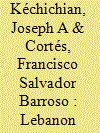

|
|
|
|
|
| Summary/Abstract |
Lebanese consociationalism has been under stress due to serious internal and external pressures. Though Lebanese regional and global leaders continue to pay lip service to Lebanon’s unity and uphold putative commitments to its sovereignty and territorial integrity, partition to resolve internal crises remains on the table. After a long and still unsettled civil war, absolute internal discord among citizens and, increasingly, the uprisings throughout the region, partition was and is once again openly discussed by many even if most camouflage it under the decentralization, federalism, or con-federalism schemes. The article underlines the inherent vulnerabilities of the Lebanese state and analyzes its deep fault lines raising a serious question about the future integrity of Lebanon.
|
|
|
|
|
|
|
|
|
|
|
|
|
|
|
|
| 16 |
ID:
121965


|
|
|
| 17 |
ID:
082509


|
|
|
|
|
| Publication |
2008.
|
| Summary/Abstract |
Based on field research in Lebanon and Sri Lanka, this article discusses the ways in which Hizballah and the LTTE use nonprofit service provision as a tool for increasing community support. The article compares the organizations' goals for service provision and specific structures of service provision. The difference in resources and capacity between the two organizations has shaped the structure of service provision used by each organization. Whereas Hizballah autonomously operates a sophisticated group of nongovernmental organization (NGO) service providers, the LTTE has developed an elaborate system for controlling and channeling the resources of existing local and international NGO service providers
|
|
|
|
|
|
|
|
|
|
|
|
|
|
|
|
| 18 |
ID:
064457
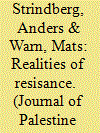

|
|
|
| 19 |
ID:
080343
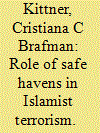

|
|
|
|
|
| Publication |
2007.
|
| Summary/Abstract |
This article will develop an explanatory theory on terrorist safe havens. Focusing on Islamist Terrorist networks, this article argues that four specific conditions are necessary for the establishment of a safe haven for Islamist terrorist networks: geographic features, weak governance, history of corruption and violence, and poverty. At the conclusion of the article, the developed theory is applied to the Tri-Border Area of South America (TBA), where the frontiers of Argentina, Brazil, and Paraguay meet, an area overlooked by the 9/11 National Commission Report's list of Islamist terrorists' safe havens.
|
|
|
|
|
|
|
|
|
|
|
|
|
|
|
|
| 20 |
ID:
085958
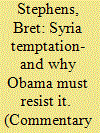

|
|
|
|
|
| Publication |
2009.
|
| Summary/Abstract |
" Start with Syria." Thus did Aaron David Miller advise the incoming Obama administration on where its Miseast peacemaking priorities should lie. Miller, a former State Department official who first made a name for himself as a leading American negotiator in the Arab-Israeli peace percesses of the 1990's had lost his faith that a deal between Israel and the Palestinians was possible, at least in the near term.
|
|
|
|
|
|
|
|
|
|
|
|
|
|
|
|